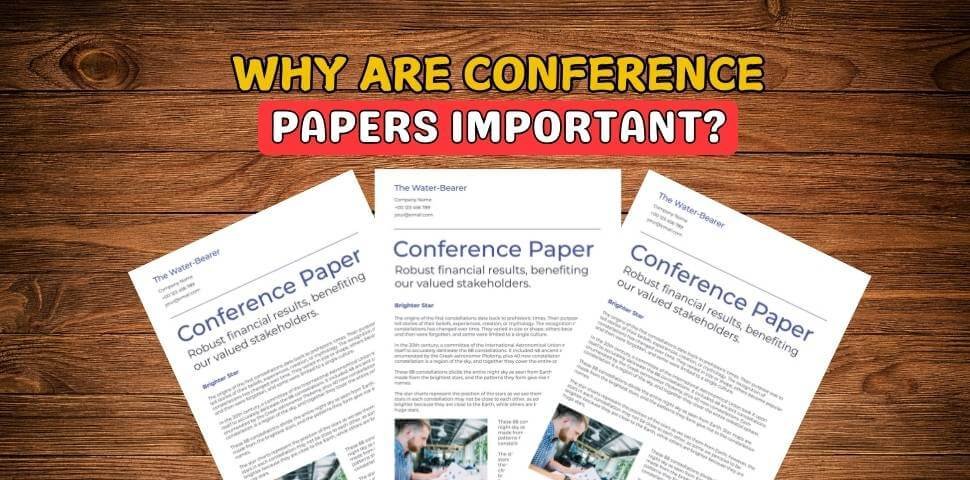Conference papers are scholarly works presented at academic gatherings, showcasing new or ongoing research. They provide researchers with an opportunity to share insights, receive feedback, and engage with peers in their field. But why are conference papers so important?
They offer an effective platform for testing new ideas, introducing work to colleagues, and refining research questions. Presenting at conferences allows researchers to gain valuable feedback from a community of scholars and enhances their professional standing within the discipline.
Would you like to learn more about what we do? In the remainder of this article, we will explore the many benefits of conference papers and how they can advance your academic career.
How Do Conference Papers Help Advance Research?
Conference papers help researchers by providing a space to share ideas and gain useful feedback from others. Researchers can present their findings, improve their work, and explore new ways to develop their studies. This process often opens doors for fresh research opportunities and stronger collaboration efforts. Moreover, presenting your work in a conference can build your academic reputation quickly.

Additionally, conference papers give researchers a chance to make their work more visible and recognized within their field. This visibility often leads to new partnerships and potential funding for future projects. The insights gained from these events help refine ongoing research and shape future discoveries. Conference papers also contribute to the broader knowledge in a particular discipline.
What Makes a Good Conference Paper?
A good conference paper is not only well-written but also effectively communicates new ideas and research findings. Crafting a strong paper requires a balance of originality, clarity, and relevance. It should engage the audience and offer valuable insights.
- Clarity is essential when explaining your research in a conference paper. Avoid jargon and ensure your message is easily understood.
- Strong conference papers are built on well-researched and credible information. Your arguments should be backed by solid evidence.
- Highlight the relevance of your research to current industry challenges. This is particularly important when preparing a conference paper for specialized events, such as HR or similar conferences. So, for instance when writing a conference paper for HR conference you must make sure you paper is relevant to the conference.
- An engaging paper sparks discussion and invites feedback. It should encourage readers to think critically about your topic.
- A good paper includes a clear introduction, body, and conclusion. Each section should flow smoothly into the next, maintaining coherence.
Why are Conference Papers Important?
Conference papers hold immense significance in the academic and research communities for a variety of reasons. They not only allow researchers to share their latest findings but also open doors to new opportunities and collaborations. Let’s explore the top seven reasons why conference papers are so important.

Dissemination of Research
Conference papers provide a platform for researchers to share new findings with a larger, knowledgeable audience. This helps spread fresh ideas and innovations within the academic community, enhancing collective knowledge. By sharing work, researchers can influence the direction of research in their field.
Presenting papers at conferences also helps to bridge the gap between theory and practice. Attendees can apply the knowledge presented, fostering real-world innovation. This wider dissemination amplifies the impact of the research beyond just the academic sphere.
Feedback and Improvement
Presenting at conferences offers a valuable chance to get feedback from peers and experts in the field. Feedback helps researchers refine their work and make necessary improvements before submitting to journals. The insights gained often lead to a more polished and rigorous final product.
Researchers can also benefit from understanding how their work is perceived by a broader audience. This allows them to address gaps they might not have noticed earlier. Conference feedback can be instrumental in evolving research methods and refining hypotheses.
Networking Opportunities
Conferences are ideal spaces for building professional relationships and expanding one’s academic network. Meeting scholars working on similar topics fosters collaboration, leading to future research opportunities. These connections can also enhance career advancement by creating partnerships with industry professionals.
Face-to-face interaction at conferences strengthens relationships that emails or virtual meetings cannot replicate. The informal discussions after presentations can lead to new ideas and research directions. Networking at these events can be the catalyst for long-term academic collaborations.
Professional Recognition
Presenting a conference paper enhances the presenter’s professional reputation and recognition in their academic field. Being a speaker or panelist establishes authority and positions the researcher as an expert. This recognition opens doors to publishing opportunities and invitations to future conferences.
Increased visibility through conference presentations can also lead to collaborations with high-profile researchers. Additionally, it helps researchers stand out in an increasingly competitive academic landscape. Recognition at conferences plays a key role in building a strong professional profile.
Stimulating Further Research
Conferences often serve as incubators for new research ideas and collaborations among researchers from different disciplines. The exchange of diverse perspectives sparks creative solutions and research paths that wouldn’t emerge in isolation. This cross-pollination drives the field forward with fresh insights and approaches.
Researchers leave conferences inspired by new ideas, ready to tackle unresolved questions. These events are a breeding ground for innovation and future research endeavors. Discussions during and after presentations can shift research directions and prompt new studies.
Building Confidence in Presentation Skills
Presenting at conferences boosts a researcher’s confidence and hones their communication skills. It helps them learn how to explain complex topics to diverse audiences. This experience is invaluable in preparing for larger public speaking opportunities.
Additionally, the experience helps researchers improve their presentation techniques, such as time management and audience engagement. The more they present, the more comfortable they become with sharing their work. Strong presentation skills are an asset in academic and professional settings alike.
Contributing to Academic Communities
Conference papers contribute significantly to academic communities by fostering collective learning and knowledge sharing. Each presentation adds a new piece to the ever-growing puzzle of academic inquiry. Researchers collectively build on each other’s work to advance the field as a whole.
This contribution enriches the academic landscape, creating an ecosystem of shared learning. As researchers present their work, they inspire others to ask new questions and explore new angles. Conferences are a vital platform for keeping academic dialogue alive and evolving.
Which Factors to Keep in Mind While Write a Conference Papers?
Writing a conference paper requires attention to several key factors to ensure the paper is well-received and effective. These factors help structure your ideas, present your research clearly, and engage your audience. Keeping these points in mind will help you craft a paper that stands out.

Clarity of Research Purpose
Your paper should clearly communicate the purpose of your research from the start. Avoid vague descriptions and ensure the main question is well-defined. This helps readers understand what to expect and why your work matters. A focused paper keeps the audience engaged and minimizes confusion.
Effective Structure and Organization
Organizing your paper with a clear introduction, body, and conclusion is essential. Each section should build logically on the previous one, ensuring a smooth flow. Maintaining the proper format for conference papers is also crucial to ensure your work meets industry standards. A well-organized paper is easier for readers to follow and appreciate.
Engagement with Current Literature
Your paper must reference current research to show its relevance within your field. Use recent studies and data to support your arguments and ideas. This demonstrates that your research contributes to ongoing discussions. Including this makes your paper more credible and valuable to the audience.
Conciseness and Relevance
Conference papers typically have limited word counts, so make every sentence count. Avoid unnecessary details or tangents that do not support your main argument. Focus on delivering key insights that are relevant to the topic. A concise paper is more likely to hold the reader’s attention throughout.
Audience Awareness
Consider who will be attending the conference and reading your paper. Tailor your language and explanations to fit their level of understanding. Avoid overly technical jargon unless the audience is highly specialized. Knowing your audience helps create a paper that resonates better with them.
Tips to Help You Present a Conference Paper at a Conference?
Presenting a conference paper can be both exciting and nerve-wracking. Preparing well and delivering your message effectively will make your presentation stand out. Here are some practical tips to help you present confidently at a conference.
- Start with a clear introduction to grab the audience’s attention. Summarize your main points quickly to set expectations early.
- Practice your presentation multiple times to ensure a smooth delivery. Timing is crucial, so stick to your allotted minutes.
- Engage your audience by making eye contact and using gestures. This helps create a connection and keeps their attention.
- Use visual aids sparingly to highlight key points. Avoid overloading your slides with text, which can distract the audience.
- Speak slowly and clearly, ensuring everyone understands your message. Avoid rushing through your points, even if time is short.
- Prepare for questions at the end by anticipating potential queries. Answer confidently and clarify any misunderstandings your audience may have.
Frequently Asked Questions about Why are Conference Papers Important?
There is no doubt that conference papers play a crucial role in academic and research activities, and they offer a number of benefits to researchers and to the broader community. They provide opportunities for knowledge sharing, feedback, and professional growth. Here are a few relevant FAQs that explain why conference papers are important:
What Role Do Conference Papers Play in Academic Growth?
Conference papers allow researchers to present their latest work and receive constructive feedback. This helps improve the quality of their research and builds credibility within their academic community. Presenting at conferences also enhances networking and collaboration opportunities.
How Do Conference Papers Contribute to Knowledge Dissemination?
Presenting conference papers spreads new research findings to a wider audience. This exchange of information accelerates the adoption of innovative ideas and approaches. Conference presentations are key in promoting collective learning and advancing knowledge across different fields of study.
Why Are Conference Papers Beneficial for Early-Career Researchers?
Conference papers help early-career researchers establish their reputation in their field. By presenting, they gain recognition, improve their presentation skills, and receive valuable feedback. These opportunities enhance their confidence and lead to professional growth within academic circles.
Can Conference Papers Help Researchers Find Collaborators?
Yes, conference papers facilitate networking with other scholars and professionals in similar fields. This opens doors to potential collaborations for future projects or research studies. Collaboration helps generate new research ideas and often leads to more impactful work.
How Do Conference Papers Improve Research Quality?
Feedback from peers during a conference presentation is valuable for refining research. Researchers can improve their methods, identify gaps, and consider new perspectives. This process ensures that the final research output is well-developed and robust.
Wrap Up
To sum up, conference papers play a vital role in shaping your academic and professional journey. They let you share ideas, gain feedback, and connect with peers in your field. So, you might be asking yourself, why are conference papers important in this context?
They help advance your research, boost your reputation, and inspire new collaborations with others. Presenting at conferences allows you to contribute to your field and grow both personally and professionally. Embracing these opportunities enriches your experience and opens doors to lasting relationships.
